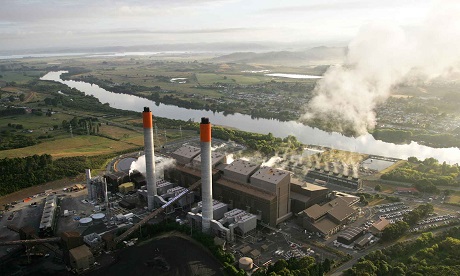New Zealand’s coal use is increasing – even though it’s considered the planet’s worst, most polluting fossil fuel.
Coal emits about 30 percent more carbon dioxide than the next worst fossil fuels, diesel and petrol.
MBIE’s Quarterly Energy Statistics say between January and March this year New Zealand used the same amount of coal to generate electricity as in 2016 and 2017 combined.
Four years ago the country had a 90% rate of renewable energy, but now we have just 70%; and the country is burning imported coal to keep the lights on.
Climate campaigners are appalled we’re still burning coal at such a scale – despite Prime Minister’s statements that climate action is imperative.
“The issues that have been going on – low hydro-lakes, but also lots of outages and lack of reliability at the gas fields – [mean] we’ve been burning coal as a back-up fuel,” Greenpeace says.
Energy Minister Megan Woods says our reliance on fossil fuel for electricity generation during dry hydrological years is the reason the government is investigating the NZ Battery project.
“Being able to store more renewable energy like wind and solar is key to a low-emissions electricity system, would encourage even more investment in renewables and provide more opportunities for the transport and industrial sectors to switch to cleaner energy use,” she says.
Despite evidence against the use of fossil fuels, not everyone is in favour of dispensing with coal. They say it’s practical and we’ll be using it for decades to come.
Westland mayor Bruce Smith thinks coal will be around for some time as a backup energy source.
“It’s easy to talk about renewable energy but at the end of the day we can’t govern the level of the lakes.
“There’s a degree of common sense, a practical aspect that needs to be looked at.
“It’s simply that the best form of heating that we’ve got at the moment and the best form of energy is coal, and I don’t see that changing.”
Smith wants more electricity generation from rivers.
“We have 206 rivers on the West Coast. I can’t believe that run-of-the-river hydro is not an absolute priority.”
The Coal Action Network says profit-driven retail electricity companies, of which the government owns over 50 per cent, use whatever fuel is needed, and economics – not the environment – is the major factor.
Genesis Energy, for instance, is still using its coal boilers at its Huntly Power Station, despite aiming to close them in 2018.
To March this year, 44 per cent of its total electricity generation came from coal.
Keeping global warming in check need to consign coal power to history, says Alok Sharma, who is the British president of this year’s U.N. climate conference (COP 26).
The Group of Seven (G7) nations have pledged to scale up technologies and policies that accelerate the transition away from unabated coal capacity.
Sharma says island nations want the Group of 20 rich and emerging nations (G20) biggest emitters to follow suit.
Source
- NCR Online
- Stuff
- CathNews
- Image: Greenpeace
